 |
|||||||||




 |
|||||||||




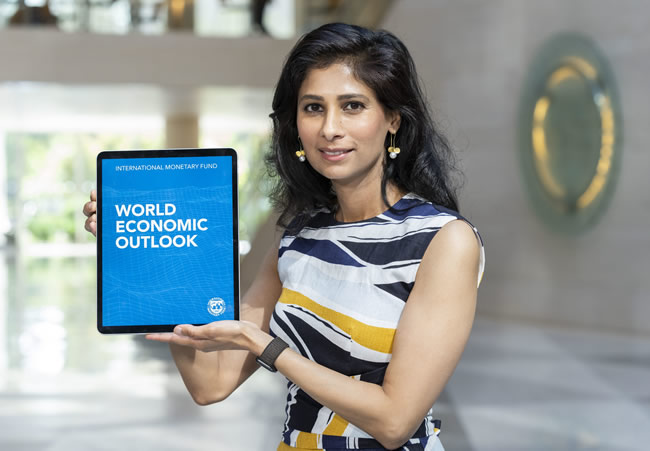
Photo: International Monetary Fund Chief Economist Gita Gopinath presents the World Economic Outlook update. IMF Photo/Cory Hancock. July 27, 2021. Washington, D.C., United States. Image provided by & copyright © IMF.
Washington, DC., July 27, 2021 — The global economy is growing but widening gaps between advanced economies and many emerging markets and developing economies are a concern. The International Monetary Fund said that in its latest update of the World Economic Outlook on Tuesday.
Global growth is forecast at 6 percent for 2021, unchanged from the previous forecast in April. Still, the composition of that has changed, said the Fund’s Chief Economist Gita Gopinath, ahead of the report’s release.
“Global growth is projected to be 6 percent this year, which is unchanged from our April forecast. However, the composition has changed. We are upgrading growth for advanced economies, and that’s almost entirely offset by a downgrade for emerging markets and developing economies. Next year, we have upgraded growth to 4.9 percent, and that’s mainly driven by anticipated further financial support in the U.S.,” said Gopinath, the IMF’s chief economist.
These revisions reflect differences in pandemic developments as the delta variant takes over. Close to 40 percent of the population in advanced economies has been fully vaccinated, compared with just 11 percent in emerging market economies. That number is even lower still in low-income developing countries.
Aftershocks from the pandemic upheaval of last year pose unique policy challenges. Pent-up demand and supply chain bottlenecks are putting upward pressure on prices. Nonetheless, in most advanced economies, inflation is expected to subside to pre-pandemic ranges in 2022.
“One of the major fault lines remains the pandemic. In addition, we see newer virus variants far more transmissible, like the Delta variant that we see right now. In a world where vaccine access remains highly inequitable, that will have a big hit on the economic recovery. Another major risk and fault line is concerning financial conditions. Suppose, for instance, inflation in the U.S. is more persistent than we expected. In that case, that could lead to a faster tightening in monetary policy, which could then again disrupt financial market conditions. So, these are some of the major risks we are concerned about,” explained Gopinath.
The recovery is not assured until the pandemic is beaten back globally. However, concerted, well-directed policy actions at the multilateral and national levels can make the difference between a future where all economies experience durable recoveries or one where divergences intensify, the poor get poorer, and social unrest and geopolitical tensions grow.
“First and foremost, the world needs to be fully vaccinated, and this requires multilateral action to make sure that sufficient vaccine doses are made available to developing countries. Second, individual governments will need to tailor their policy support to the stage of the crisis. They will have to do this by nesting their monetary policies in incredible medium-term fiscal frameworks. Third, in the case of monetary policy, central banks should look through transitory inflation movements. However, it’s crucial that they remain prepared and strongly communicate what they will do if it turns out that inflation goes up even higher and is much more persistent than expected.” said Gopinath.
Source: IMF
|GlobalGiants.Com|
Edited & Posted by the Editor | 3:38 PM | View the original post
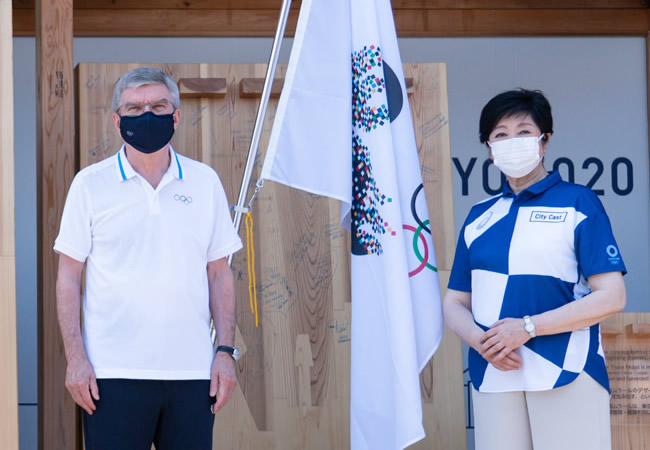

Photos: Olympic Truce Mural Inauguration. Tokyo, Japan. July 19, 2021. During a visit to the Olympic Village, IOC President Bach signed the Peace Wall ahead of TOKYO 2020 Olympic Games. Images provided by & Copyright © IOC/Greg Martin.
Tokyo, July 19, 2021 - Athletes and officials participating in the Olympic Games Tokyo 2020 will be encouraged to show their support for the Olympic Truce by signing the Olympic Truce Mural in the Olympic Village.
The Mural was inaugurated at the Olympic Village Plaza by the International Olympic Committee (IOC) and Tokyo 2020, in the presence of IOC President Thomas Bach, along with the IOC Vice-Presidents, the outgoing members of the IOC Athletes’ Commission, Tokyo 2020 Village Mayor KAWABUCHI Saburo, Tokyo 2020 President HASHIMOTO Seiko and the Governor of Tokyo, KOIKE Yuriko.
In his speech, the IOC President said: “Today we are inaugurating the Olympic Truce Mural here at the beating heart of the Olympic Games, the Olympic Village. It is here where the Olympic spirit comes to life. The athletes show us that, despite all our differences, humankind can live together in peace. That is our Olympic message: yes, it is possible to compete with each other, even for the highest prize, but at the same time to live together peacefully under one roof in the Olympic Village.”
Addressing the athletes who are about to compete in Tokyo, President Bach said: “It is in this Olympic spirit that I invite you to leave your signature on the Olympic Truce Mural, to show your commitment to making a better and more peaceful world through sport.”
During the inauguration ceremony, Tokyo 2020 President HASHIMOTO Seiko stressed: “With the arrival of representatives from all over the world in Tokyo, I believe the time of darkness and division caused by the spread of COVID-19 is slowly coming to an end, and a new era of peace and solidarity is beginning. Here in Tokyo, I hope the athletes will add their signature on the Mural, the voice of the Olympic Games for peace all over the world.”
The inauguration of the Olympic Truce Mural took place three days after the Olympic Truce for the Olympic and Paralympic Games Tokyo 2020 came into effect.
The United Nations has established the Olympic Truce through its resolution entitled “Building a peaceful and better world through sport and the Olympic Ideal.” The UN passed the resolution unanimously at the 74th Session of the UN General Assembly in 2019. It was co-sponsored by 186 out of 193 UN Member States. It demonstrated the UN’s international community’s recognition of the power of sport and the relevance of the Olympic Games in bringing the world together in peaceful competition. The resolution calls for respecting the Olympic Truce from today to September 12, 2021 - seven days before the start of the Olympic Games until seven days after the Paralympic Games.
Earlier in July, the President of the UN General Assembly, Volkan Bozkir, made a solemn appeal to the UN Member States to observe the Olympic Truce for the Olympic and Paralympic Games Tokyo 2020. The United Nations (UN) Secretary-General António Guterres reiterated that call last week.
The tradition of the Olympic Truce, or “Ekecheiria,” dates back to the 9th century BC in Ancient Greece as a period during which all parties ceased war and conflict to allow for safe travel to and from the ancient Olympic Games. Today, the Olympic Truce represents the IOC’s aim to inspire peace through sport.
Source: International Olympic Committee
|GlobalGiants.Com|
Edited & Posted by the Editor | 12:37 PM | View the original post
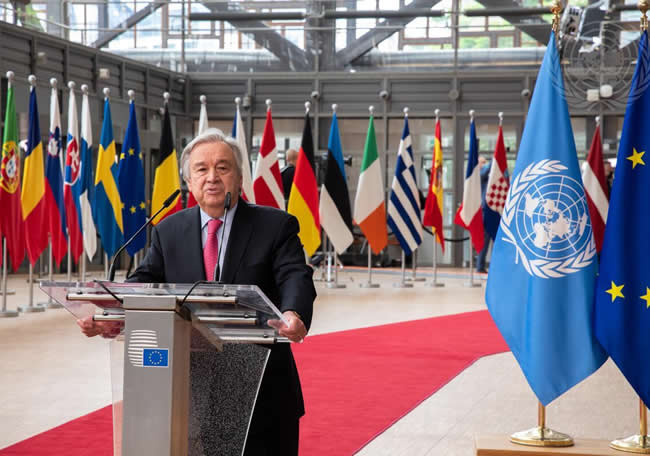
Photo: UN Secretary-General, António Guterres, briefs reporters during a visit to the European Council in Brussels, Belgium. Also in attendance was Charles Michel, President of the European Council. June 24, 2021. Brussels, Belgium. Image Credit: United Nations.
Source: United Nations
|GlobalGiants.Com|
Edited & Posted by the Editor | 3:33 PM | View the original post
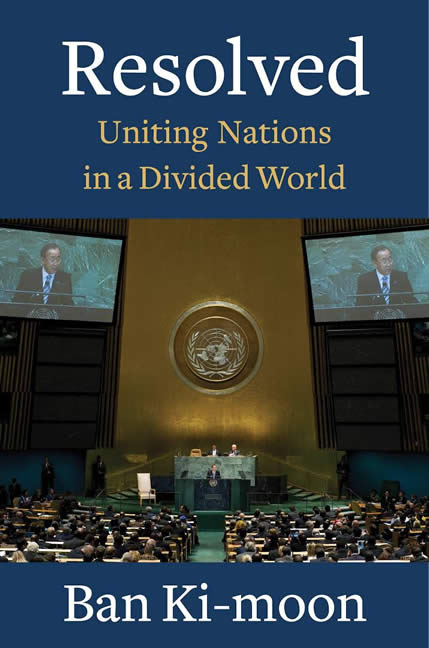
Photo: The cover of “Resolved: Uniting Nations in a Divided World” by Ban Ki-moon. Columbia University Press.
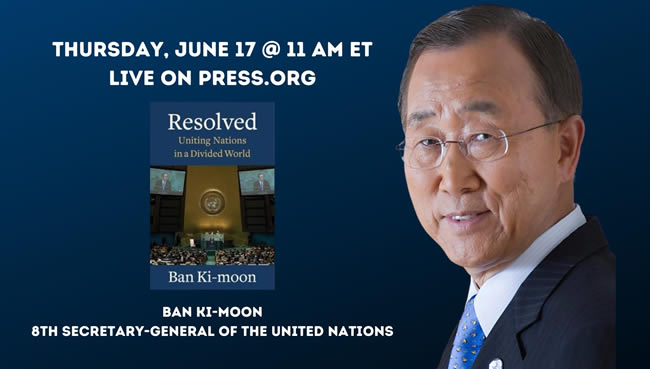
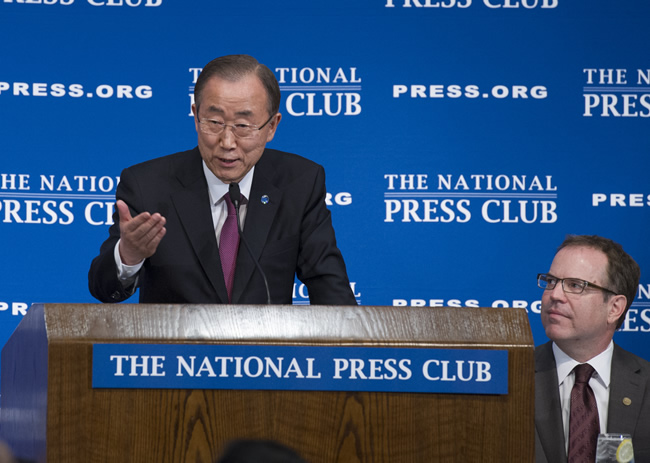
Photo: UN Secretary-General Ban Ki-moon (left) addresses the National Press Club in Washington, D.C. He discussed the challenges and opportunities that the United Nations faces in its 70th year, from fostering sustainable development and dealing with climate change to confronting violent extremism. He took questions during an hour-long session. At right is John Hughes, President of the National Press Club. April 16, 2015. UN Photo/Eskinder Debebe. [File Photo].
Washington, DC, June 18, 2021 — Former United Nations Secretary-General Ban Ki-moon called for a return to multilateral diplomacy and for people to be “global citizens.” He was speaking during a National Press Club Virtual Headliners Book Event on Thursday.
In a discussion coinciding with the release of his new book “Resolved: Uniting Nations in a Divided World,” Ban said global alliances have fractured amid the crises of coronavirus, climate change, and refugees fleeing conflict. He blamed world leaders for not doing enough.
“Why are we not doing more and better? For me, the fault most often lies with the leaders of the world,” Ban said. “Too many autocrats and also dictators put themselves before their countries and before the people who elected them.”
That fracturing of global alliances undermined the world’s response to COVID-19, mainly when the United States chose to withdraw from the World Health Organization, a move Ban called “totally unacceptable.” And he said the wealthiest countries “looked inward first,” meaning an uneven distribution of vaccines.
However, the recent G7 summit in the United Kingdom gave Ban some reasons for optimism as leaders there agreed to share 1 billion doses with poorer countries and reaffirmed their pledge of $100 billion a year for poorer countries to help them fight climate change.
But he criticized the United States, which under the Trump administration, stepped back from the global fight against climate change and withdrew from the Paris climate accord.
“This kind of leadership has shown no concern to the people, and it is only the people on the ground who will suffer,” Ban said. “This is what I found heartbreaking.”
And he said the UN could do more to help, especially in Syria, which has struggled for a decade amid civil war and a humanitarian crisis. Instead, Ban said, it is paralyzed and unable to “deliver timely, effective, and powerful messages or actions because of the divisions among the Security Council members, particularly veto-power members.”
Multilateralism has borne good work in recent years, Ban said, especially in getting 196 signatories for the Paris climate accord and adopting the UN’s 17 Sustainable Development Goals. But he said there is “so much work ahead,” not only in fighting climate change but also promoting peace in Myanmar, Afghanistan, Israel, and elsewhere.
Ban served as UN Secretary-General from January 2007 to December 2016. His tenure coincided with numerous incidents, including the Arab Spring, nuclear proliferation in Iran and North Korea, the Ebola epidemic, and brutal new conflicts in Central Africa.
Ban, who served as a South Korean diplomat and foreign minister before becoming the UN’s eighth Secretary-General, said his home country showed what is possible. Ban recalled being raised during the Korean War, then coming of age and watching the country grow from a dictatorship to a “stable and prosperous democracy.”
“Without the United Nations, Korea would not be as it is today,” Ban said.
Resolved is Ban Ki-moon’s account of his decade at the organization’s helm during a period of historical turmoil and promise. Meeting challenges and resistance with a belief in the UN’s peacekeeping mission, development, and human rights, he steered the United Nations through a volatile period. As secretary-general, Ban also forged global agreements to fight extreme poverty and address the climate crisis.
Ban performed what has been called “the impossible job on this earth” with a genuine belief in collective action and global transformation. Freed from the diplomatic constraints of a lifetime of public service, he offers a candid assessment of the people and events that shape this era and a bracing analysis of what lies ahead.
The one-hour program streamed live on the National Press Club’s website and YouTube Channel. Thus, it was accessible to both the media and members of the general public.
Founded in 1908, the National Press Club is the “World’s Leading Professional Organization for Journalists.” The Club has about 3,000 reporters, editors, and professional communicators worldwide, representing nearly every major news organization. It hosts almost 2,000 events per year in its 54,000 square foot facility located in downtown Washington, just three blocks from the White House.
Source: National Press Club, Washington, DC
|GlobalGiants.Com|
— The Editor is a Member of the National Press Club.
Edited & Posted by the Editor | 3:56 AM | View the original post
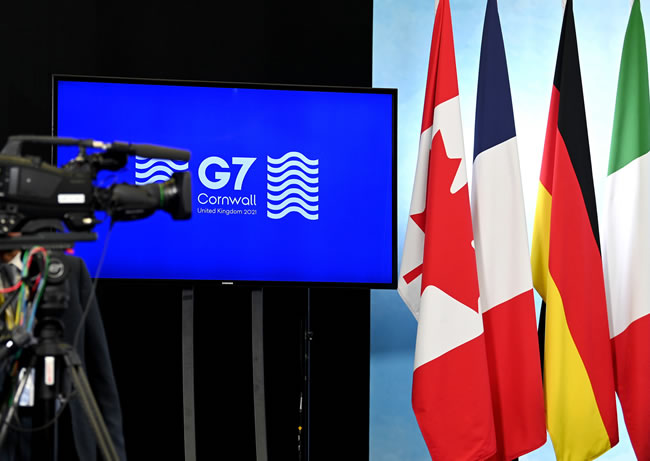
Photo: Setting up the US press conference during the G7 Summit at Newquay airport, Cornwall, UK, on 13th June 2021. Image provided by & copyright © Karwai Tang/G7 Cornwall 2021.
— SUMMARY OF CARBIS BAY G7 SUMMIT COMMUNIQUÃâ° —
⢠Our Shared Agenda for Global Action to Build Back Better
We, the Group of Seven leaders, met in Cornwall on 11-13 June 2021, determined to beat COVID-19 and build back better. We remembered everyone who has been lost to the pandemic and paid tribute to those still striving to overcome it. Inspired by their example of collaboration and determination, we gathered united by the principle that brought us together initially, that shared beliefs and shared responsibilities are the bedrock of leadership and prosperity. Guided by this, our enduring ideals as free open societies and democracies, and by our commitment to multilateralism, we have agreed on a shared G7 agenda for global action to:
End the pandemic and prepare for the future by driving an intensified international effort, starting immediately, to vaccinate the world by getting as many safe vaccines to as many people as possible as fast as possible. Total G7 commitments since the start of the pandemic provide for a total of over two billion vaccine doses, with the pledges since we last met in February 2021, including here in Carbis Bay, providing for one billion doses over the next year. At the same time, we will create the appropriate frameworks to strengthen our collective defenses against threats to global health by:
Reinvigorate our economies by advancing recovery plans that build on the $12 trillion of support we have put in place during the pandemic. We will continue to support our economies for as long as is necessary, shifting the focus of our support from crisis response to promoting growth into the future. We would work with plans that create jobs, invest in infrastructure, drive innovation, support people, and level up so that no place or person, irrespective of age, ethnicity, or gender, is left behind.
Secure our future prosperity by championing freer, fairer trade within a reformed trading system, a more resilient global economy, and a fairer global tax system that reverses the race to the bottom. We will collaborate to ensure future frontiers of the global economy and society, from cyberspace to outer space, increase all people’s prosperity and well-being while upholding our values as open societies. We are convinced of the potential of technological transformation for the common good per our shared values.
Protect our planet by supporting a green revolution that creates jobs, cuts emissions, and seeks to limit the rise in global temperatures to 1.5 degrees. We commit to net-zero no later than 2050, halving our collective emissions over the two decades to 2030, increasing and improving climate finance to 2025, and conserving or protecting at least 30 percent of our land and oceans by 2030. We acknowledge our duty to safeguard the planet for future generations.
Strengthen our partnerships with others around the world. We will develop a new partnership to build back better for the world through a step-change in our approach to investment for infrastructure, including through an initiative for clean and green growth. We resolve to deepen our current partnership to a new deal with Africa. It includes magnifying support from the International Monetary Fund for countries that most need it. It would support our aim to reach a total global ambition of $100 billion.
Embrace our values as an enduring foundation for success in an ever-changing world. We will harness the power of democracy, freedom, equality, the rule of law, and respect for human rights to answer the most critical questions and overcome the most significant challenges. We will do this to value the individual and promote equality, especially gender equality, including by supporting a target to get 40 million more girls into education and at least $2 billion for the Global Partnership for Education.
We shall seek to advance this open agenda in collaboration with other countries and within the multilateral rules-based system. In particular, we look forward to working alongside our G20 partners and with all relevant International Organisations to secure a cleaner, greener, freer, fairer and safer future for our people and planet.
â¢â¢â¢â¢â¢â¢â¢â¢
Source: G7 SUMMIT 2021
|GlobalGiants.Com|
Edited & Posted by the Editor | 2:50 AM | View the original post
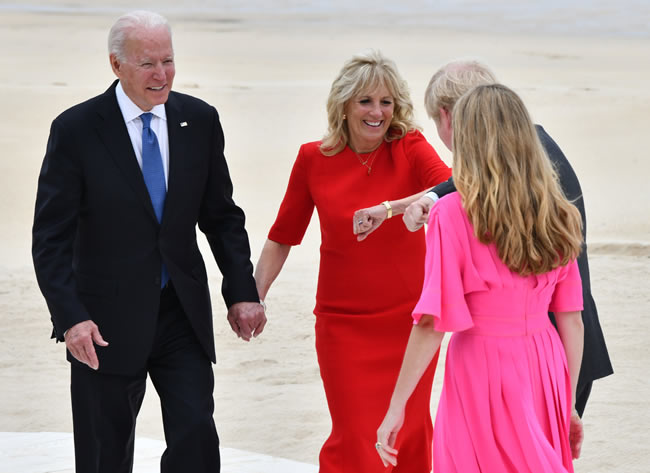
Photo: United Kingdom Prime Minister Boris Johnson and Carrie Symonds, United States of America President Joe Biden and Jill Biden pose for the official family picture at Carbis Bay hotel during the G7 Summit in Cornwall, UK, on the 11 June 2021. Image provided by & Copyright © Justin Goff/G7 Cornwall 2021.
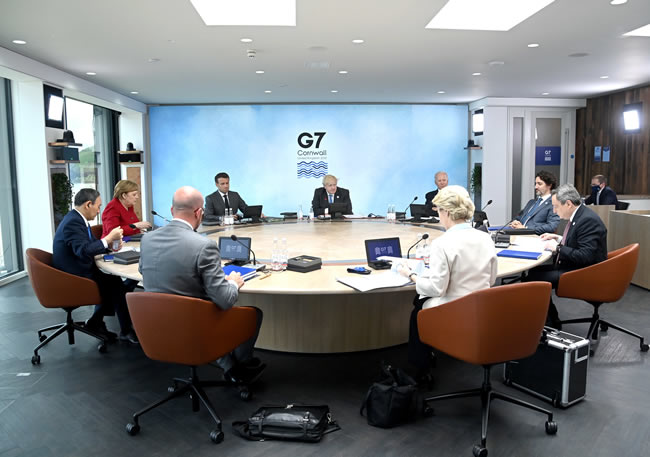
Photo: G7 Leaders Plenary Session at G7 Leaders’ Plenary Room, Carbis Bay, during the G7 Summit in Cornwall, UK, on 11 June 2021. Image provided by & Copyright © Karwai Tang/G7 Cornwall 2021.
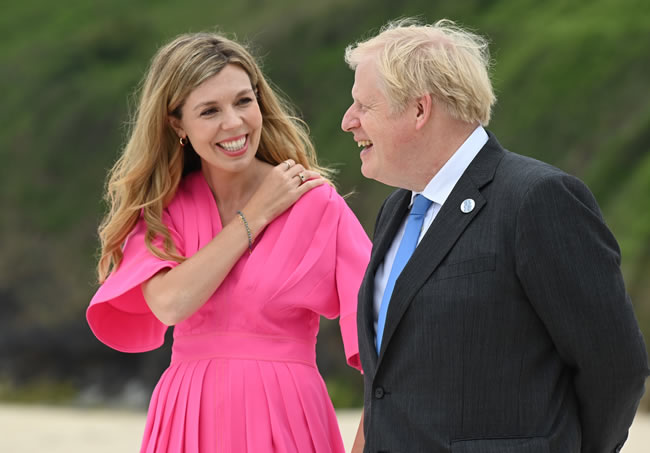
Photo: Boris Johnson and wife Carrie at Carbis Bay hotel during the G7 Summit in Cornwall, UK on 11 June 2021. Image provided by & Copyright © David Fisher/G7 Cornwall 2021.
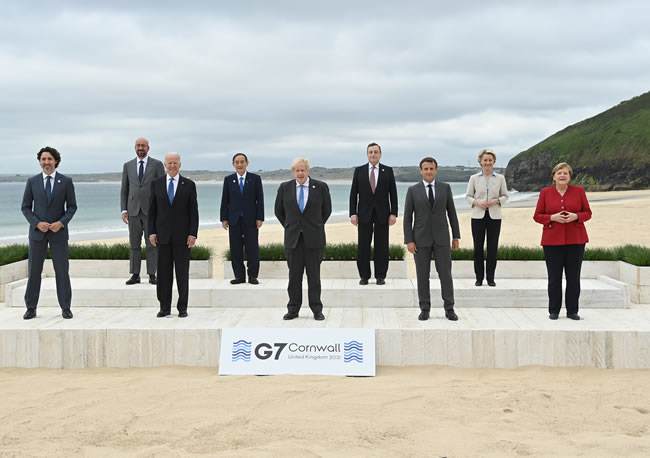
Photo: G7 Leaders’ Family Photo. (Back row L to R) EU Council President of the European Council Charles Michel, Japanese Prime Minister Yoshihide Suga, Italian Prime Minister Mario Draghi, EU Commission President Ursula von der Leyen, (Front row L to R) Canadian Prime Minister Justin Trudeau, United States of America President Joe Biden, United Kingdom Prime Minister Boris Johnson, French President Emmanuel Macron and German Chancellor Angela Merkel pose for the official family picture at Carbis Bay hotel during the G7 Summit in Cornwall, UK on 11 June 2021. Image provided by & Copyright © G7 Cornwall 2021.
⢠G7 Cornwall Summit — Summit Meeting Agenda
⢠Friday 11 June
Plenary Session One: Economic Recovery
G7 Leaders
Sarah Sands, Chair of the G7 Gender Equality Advisory Council, will address the G7 leaders.
⢠Saturday 12 June
Plenary Session Two: Global Resilience
G7 Leaders
Mark Sedwill, Chair of the G7 Economic Resilience Panel, will address the G7 Leaders.
Plenary Session Three: Foreign Policy
⢠G7 Leaders
Plenary Session Four: Health
G7 Leaders and Guests, plus International Organisations
Patrick Vallance, Chair of the International Pandemic Preparedness Partnership, and Melinda Gates, Co-Chair, and Founder of the Bill & Melinda Gates Foundation, will address the G7 Leaders and Guests.
⢠Sunday 13 June
Plenary Session Five: Open Societies
G7 Leaders and Guests, plus United Nations Secretary-General
Plenary Session Six: Climate and Nature
G7 Leaders and Guests, plus United Nations Secretary-General, plus International Organisations.
International Organisations participating virtually: International Monetary Fund, Organisation for Economic Co-operation and Development, World Bank Group, World Health Organisation, and World Trade Organisation.
Source: G7 UK 2021
|GlobalGiants.Com|
Edited & Posted by the Editor | 6:07 AM | View the original post
Heads of International Monetary Fund (IMF), World Bank Group (WB), World Health Organization (WHO), and World Trade Organization (WTO) issue extraordinary calls for financing actions by government leaders to accelerate an end to the COVID-19 pandemic.
IMF, WB, WHO, and WTO chiefs call for US$50 billion investment to generate US$9 trillion in global economic returns by 2025 and boost manufacturing capacity, supply, trade flows, and the equitable distribution of diagnostics, oxygen, treatments, medical supplies, and vaccines.
The call to action by this quadrilateral grouping comes at a dangerous point in the pandemic. As the historic World Health Assembly concludes, G7 meetings commence and follow the G20 Global Health Summit.
Doses need to be donated immediately to developing countries, synchronized with national vaccine deployment plans, including through COVAX, co-led by CEPI, Gavi, and WHO, alongside key delivery partner UNICEF.
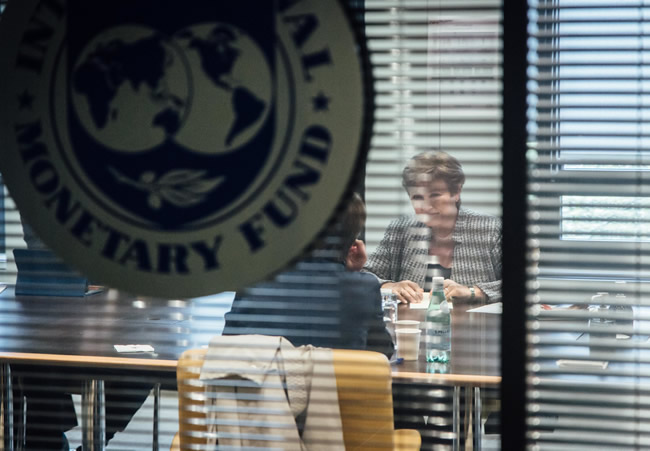
Photo: International Monetary Fund Managing Director Kristalina Georgieva meets with Odile Renaud-Basso, President of the European Bank for Reconstruction and Development (EBRD), at the IMF Paris Office. May 17, 2021. Paris, France. IMF Photo/Cyril Marcilhacy.
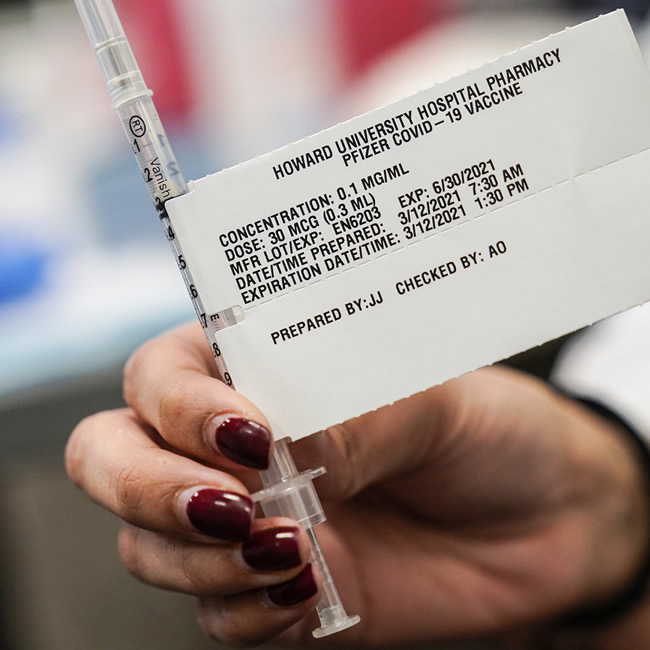
Photo: A doctor holds a syringe containing the Pfizer COVID-19 vaccine at Howard University Hospital. March 12, 2021. Washington, DC, United States. IMF Photo/Joshua Roberts.
Geneva/Washington, DC, June 1, 2021 — The heads of the world’s predominant global financing, health and trade agencies have united in urging government leaders to urgently finance a new US$50 billion roadmap to accelerate the equitable distribution of health tools. It would help end the pandemic that has devastated lives and livelihoods for 18 months. It would also set the foundations for a genuinely global recovery, as well as enhanced health security.
The leaders of the International Monetary Fund, World Bank Group, World Health Organization, and World Trade Organization [Kristalina Georgieva, Tedros Adhanom Ghebreyesus, David Malpass, and Ngozi Okonjo-Iweala] have issued a joint statement. They say the governments must act without further delay or risk continued waves and explosive outbreaks of COVID-19 and more transmissible and deadly virus variants undermining the global recovery.
Leaders of the four agencies said: “By now, it has become abundantly clear there will be no broad-based recovery without an end to the health crisis. Access to vaccination is key to both.”
The joint statement draws on a recent IMF staff analysis, which stated that US$50 billion in new investment is needed to increase manufacturing capacity, supply, trade flows, and delivery, which would accelerate the equitable distribution of diagnostics, oxygen, treatments, medical supplies, and vaccines. This injection would also give a significant boost to economic growth around the world.
“At an estimated US$50 billion, it will bring the pandemic to an end faster in the developing world, reduce infections and loss of lives, accelerate the economic recovery, and generate some US$9 trillion in additional global output by 2025, “said the leaders.
It echoes economic analysis by the International Chamber of Commerce and the Eurasia Group - both of which make a case for a relatively modest investment by governments compared to the trillions spent on national stimulus plans and lost trillions in foregone economic output. But the critical element of this is that it effectively spurs global vaccination and bridges the equity gap.
“Increasing our ambition and vaccinating more people faster: WHO and its COVAX partners have set a goal of vaccinating approximately 30% of the population in all countries by the end of 2021,” said the four leaders. “But this can reach even 40% through other agreements and surge investment, and at least 60 percent by the first half of 2022.”
The leaders have urged the governments to act on the investment opportunity to boost vaccines, oxygen, tests, and treatment supplies. The IMF, WBG, WHO, and WTO chiefs issued their joint statement as the World Health Assembly drew to a conclusion.
“To urgently get more shots in arms, doses need to be donated immediately to developing countries synchronized with national vaccine deployment plans, including through COVAX,” said the four leaders. “Cooperation on trade is also needed to ensure free cross-border flows and increasing supplies of raw materials and finished vaccines.”
The IMF, WBG, WHO, and WTO leaders would address a joint press conference later today to outline the new joint roadmap to ending the pandemic and driving the genuinely global and fast recovery.
Sources: IMF, WHO, WB, WTO
|GlobalGiants.Com|
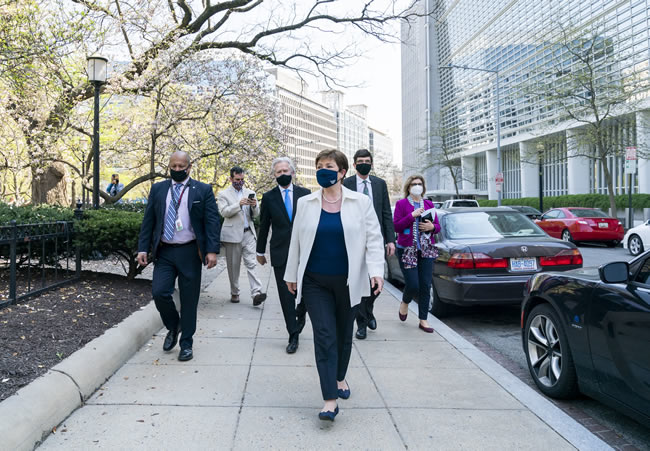
Photo: International Monetary Fund Managing Director Kristalina Georgieva walks back to IMF HQ following her interview with the BBC’s Katty Kay. April 7, 2021. Washington, DC, United States. IMF Photo/Cory Hancock.
⢠Following is the Joint Statement by Kristalina Georgieva, Tedros Adhanom Ghebreyesus, David Malpass, and Ngozi Okonjo-Iweala:
⢠A NEW COMMITMENT FOR VACCINE EQUITY AND DEFEATING THE PANDEMIC â¢
As preparations are made for the G7 Summit in the United Kingdom of Great Britain and Northern Ireland next week, the top of the agenda is how to end the COVID-19 pandemic and secure the global recovery. Urgent challenges face us.
By now, it has become abundantly clear there will be no broad-based recovery without an end to the health crisis. Access to vaccination is key to both.
There has been impressive progress on the vaccination front. Scientists have come up with multiple vaccines in record time. Unprecedented public and private financing have supported vaccine research, development, and manufacturing scale-up. But a dangerous gap between richer and poorer nations persists.
Even as some affluent countries are already discussing the rollout of booster shots to their populations, the vast majority of people in developing countries — even front-line health workers — have still not received their first shot. The worst served are low-income nations which have received less than one percent of vaccines administered so far.
Increasingly, a two-track pandemic is developing, with richer countries having access and poorer ones left behind.
Inequitable vaccine distribution is not only leaving untold millions of people vulnerable to the virus. It is also allowing deadly variants to emerge and rebound back across the world. As variants continue to spread, even countries with advanced vaccination programs reimpose stricter public health measures, and some have implemented travel restrictions. In turn, the ongoing pandemic is leading to deepening divergence in economic fortunes, with negative consequences for all.
It need not be this way. That is why we are calling today for a new level of international support for - and implementation of - a stepped-up coordinated strategy, backed by new financing, to vaccinate the world.
A recent proposal from the International Monetary Fund (IMF) staff put forward a plan with clear targets, practical actions, and a feasible cost. It builds on and supports the ongoing work of WHO, its partners in the Access to COVID-19 Tools (ACT) Accelerator initiative and its global vaccine access program COVAX and the result of the World Bank Group, the World Trade Organization (WTO), and many others.
At an estimated $50 billion, it will bring the pandemic to an end faster in the developing world, reduce infections and loss of lives, accelerate the economic recovery, and generate some $9 trillion in additional global output by 2025. It is a win for all — while around 60 percent of the gains will go to emerging markets and developing economies, the remaining 40 percent will benefit the developed world. And this is without taking into account the invaluable benefits on people’s health and lives.
⢠What does it entail?
First. Increasing our ambition and vaccinating more people faster: WHO and its COVAX partners have set a goal of vaccinating approximately 30% of the population in all countries by the end of 2021. But this can reach even 40% through other agreements and surge investment, and at least 60 percent by the first half of 2022.
To do so requires additional financing for low- and middle-income countries, with a very significant proportion in the form of grants and concessional funding. To urgently get more shots in arms, we must immediately donate doses to developing countries synchronized with national vaccine deployment plans, including through COVAX. Cooperation on trade is also needed to ensure free cross-border flows and increase raw materials and finished vaccines.
Second. Insurance against downside risks such as new variants that may necessitate booster shots. It means investing in additional vaccine production capacity by at least one billion doses, diversifying production to regions with little current power, sharing technology and know-how, scaling up genomic and supply-chain surveillance, and contingency plans to handle virus mutations or supply shocks.
We must remove all blockages to expanding supply, and we call on WTO members to accelerate negotiations towards a pragmatic solution around intellectual property. Several low- and middle-income countries are also making moves to invest in their local manufacturing capacity, which is crucial to end this pandemic and prepare for the next one.
Third. Immediate boosting of testing and tracing, oxygen supplies, therapeutic and public health measures, ramping up vaccine deployment, and the ACT-Accelerator initiative. WHO, UNICEF, the World Bank, and Gavi have been conducting vaccine readiness assessments in over 140 developing countries and providing on-the-ground support and financing to prepare for vaccine rollout.
⢠What about the cost?
Of the US$ 50 billion, there is a strong case for grants of at least US$ 35 billion. G20 governments have sent positive signals, recognizing the importance of providing about US$ 22 billion in additional funding for 2021 to the ACT-Accelerator.
Additional financing of about US$ 13 billion is needed to boost vaccine supply in 2022 and further scale up testing, therapeutics, and surveillance. The remainder of the overall financing plan — around US$15 billion — could come from national governments supported by multilateral development banks, including the World Bank’s US$12 billion financial facilities for vaccination.
For the plan to work, there are two additional requirements: speed and coordination.
It calls for upfront financing, upfront vaccine donations, and upfront precautionary investments and planning - rather than commitments that may be slow to materialize. All of this must be made available as soon as possible.
It also requires coordinated global action, grounded in complete transparency in the procurement and delivery process. The strategy’s success depends on all parties—public, private, international financial institutions, foundations — moving in tandem.
Investing US$ 50 billion to end the pandemic is potentially the best use of public money we will see in our lifetimes. It will pay a colossal development dividend and boost growth and well-being globally. But the window of opportunity is closing fast — the longer we wait, the costlier it becomes, in the human suffering and economic losses.
Today, on behalf of our four organizations, we announce a new commitment to work together to scale up needed financing, boost manufacturing, and ensure the smooth flow of vaccines and raw materials across borders. It would dramatically increase vaccine access to support the health response and economic recovery and bring needed hope.
Our institutions are stepping up to turn this hope into reality:
The IMF is preparing an unprecedented Special Drawing Rights (SDR) allocation to boost the reserves and liquidity of its members. WHO is seeking to identify financing so that the urgent needs of its Strategic Preparedness and Response Plan and the ACT-Accelerator partnership can be met, with COVID-19 Technology Access Pool (C-TAP) incentivizing the sharing of know-how and technology. The World Bank will have vaccine projects up and running in at least 50 countries by mid-year—with the International Finance Corporation working to mobilize the private sector to boost vaccine supply for developing countries. And the WTO is working on freeing up supply chains for the plan to succeed.
Ending the pandemic is a solvable problem that requires global action—now.
Let’s all pull together and get the job done.
— Kristalina Georgieva is the Managing Director of the International Monetary Fund (IMF); Tedros Adhanom Ghebreyesus is the Director-General of the World Health Organization (WHO); David Malpass is the President of the World Bank Group; Ngozi Okonjo-Iweala is the Director-General of the World Trade Organization (WTO).
Edited & Posted by the Editor | 1:41 AM | View the original post
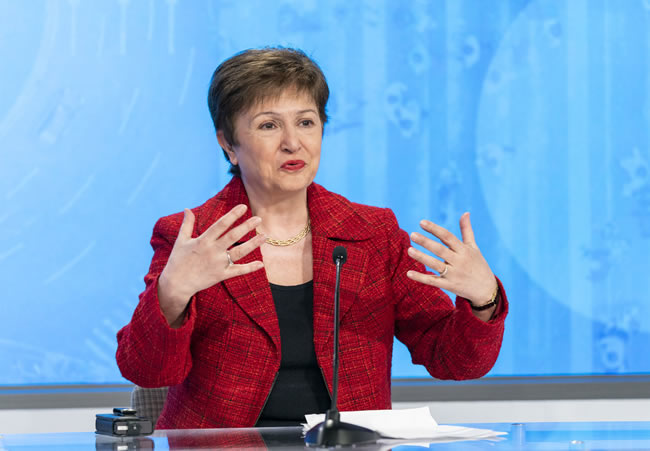
Photo: IMF (International Monetary Fund) Managing Director Kristalina Georgieva. Washington, DC, United States. IMF Photo/Cory Hancock. Image provided by & copyright © IMF.
⢠IMF (International Monetary Fund) Managing Director Kristalina Georgieva’s Remarks to the Global Health Summit, organized by the European Commission and Italy, as chair of the G20. May 21, 2021.
Excellencies,
I would like to thank Prime Minister Draghi, President Von de Leyen, and their staff for preparing this vital Summit.
By now, we all know there is no durable end to the economic crisis without an end to the health crisis. That means the pandemic policy is a monetary policy highly relevant to the work of the IMF. The economic recovery depends on how we conduct it.
In particular, the pandemic policy matters for preventing this dangerous divergence of economic fortunes about which we have been warning. It will only worsen as the gap widens between wealthy countries that have access to vaccines and emerging countries that do not, and it will slow down the exit from the crisis for everybody.
IMF staff published today a contribution to the ongoing efforts made by many others to address the gap in vaccines, diagnostics, and therapeutics many developing countries face—and help bring the Pandemic substantially under control everywhere for everyone’s benefit. It builds on the work of WHO, World Bank, Gavi, African Union and has three broad elements, at the estimated cost of $50 billion.
First. Vaccination of at least 40 percent of the population in all countries by end-2021, and at least 60 percent by the first half of 2022. To do so requires additional upfront grants to COVAX, donating surplus doses, and free cross-border flows of raw materials and finished vaccines.
Second. Insurance against downside risks such as new variants that may necessitate booster shots. It means investing in additional vaccine production capacity by 1 billion doses, diversifying production, scaling up genomic surveillance and supply-chain surveillance, and contingency plans to handle virus mutations or supply shocks.
Third. Management of the interim period where vaccine supply is limited with widespread testing and tracing, therapeutic and public health measures, and, at the same time, ramping up preparations for vaccine deployment together with any approved dose-stretching strategies.
Of the $50 billion, we envisage grant financing of at least $35 billion. G20 governments have already identified it as essential to address the $22 billion funding gap noted by the ACT-Accelerator. It would need to be topped up by an additional $13 billion in grant contributions.
The remainder of the overall financing plan - around $15 billion - could come from national governments, supported by COVID-19 concessional financing, primarily from facilities already created by multilateral development banks.
Notably, the proposal requires not just commitments but upfront financing, upfront vaccine donations, and upfront ‘at risk’ precautionary investments. It is essential that all necessary funding is available as soon as possible.
The outsized benefits dwarf the costs of the plan. As we have been stressing, a faster end to the Pandemic saves lives. It could inject the equivalent of $9 trillion into the global economy by 2025 due to a quicker resumption of economic activity. And advanced economies — asked to contribute most to this effort — would likely see the highest return on public investment in modern history, capturing 40 percent of the GDP gains and roughly $1 trillion in additional tax revenues.
Concrete and coordinated action is the way out of this unprecedented health and economic crisis. With the support of our membership, we are working towards making an essential contribution to the exit from this crisis by boosting global reserves with $650 billion Special Drawing Rights — significant for countries faced with the toughest challenges. We are stepping up lending where needed, and we are working on debt sustainability. You can count on us to play our part.
Thank you.
Source: International Monetary Fund
The International Monetary Fund (IMF) is an international financial institution headquartered in Washington, D.C. It consists of 190 countries working to foster global monetary cooperation, secure financial stability, facilitate international trade, promote high employment and sustainable economic growth, and reduce poverty worldwide.
|GlobalGiants.Com|
Edited & Posted by the Editor | 2:51 AM | View the original post
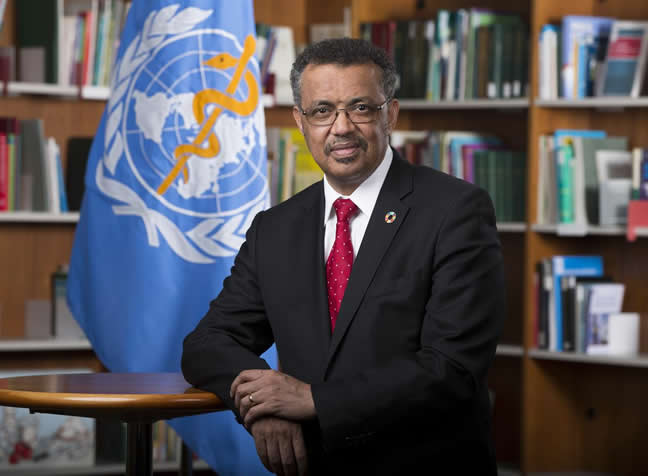
Photo: Tedros Adhanom Ghebreyesus, Director-General of the World Health Organization (WHO). Image provided by & copyright © WHO.
⢠The WHO DirectorâËâGeneral’s speech on Global Health Summit âËâ Italian G20 Presidency and the European Commission âËâ 21 May 2021:
Prime Minister Draghi,
President Ursula Von der Leyen,
Excellencies, dear colleagues, and friends,
I would like to thank the Italian G20 Presidency and the European Commission for their leadership in initiating the Rome Declaration.
We welcome the declaration, especially the commitment to support and enhance the existing multilateral health architecture for preparedness, prevention, detection, and response, with an appropriately, sustainably, and predictably funded, effective WHO at its center.
And we welcome the other commitments to strengthening national and global preparedness for preventing future pandemics.
But our commitment to the future is measured by our actions today.
Yesterday alone, more than 13 thousand people around the world lost their lives to COVID-19 - nine every single minute. Today the number will be similar. And tomorrow, and the next day.
And people will continue to die as long as the global disparity in vaccines persists.
Yes, the rapid development of COVID-19 vaccines is a triumph of science. But their inequitable distribution is a failure for humanity.
Almost 90% of all vaccines administered globally have been in G20 countries.
We can only end the pandemic if everyone has the tools to stop it.
So today, I have three requests.
First, end this pandemic with a combination of tailored public health measures and the equitable distribution of vaccines.
We call on G20 countries to fully fund the ACT Accelerator, as a matter of urgency;
To share more doses faster through COVAX. We thank all countries that have announced generous donations today. It is a very encouraging start towards the hundreds and millions of doses we will need in the coming weeks and months.
And to scale up manufacturing as a matter of urgency, through sharing technology and know-how, and waiving intellectual property provisions, focusing on Africa.
The G20 has all the means to vaccinate the world, and the world cannot wait any longer.
Second, strengthen health security, nationally and globally.
We welcome the commitments of the Rome Declaration to support the full implementation of the International Health Regulations and for a multisectoral, all-of-government, all-of-society, evidence-based, One Health approach to health security.
WHO is committed to working with all Member States to explore every avenue for keeping the world safer. It includes the proposal for a treaty on pandemic preparedness and response.
We believe such a treaty would create a high-level framework for political accountability that redefines the way countries deal with health emergencies - and that would encompass all countries, not just the richest and most powerful.
The treaty could address the challenges we’re facing now.
And third, drive progress towards universal health coverage in all countries, based on vital primary health care.
The pandemic has demonstrated that health is not a luxury but the cornerstone of social, economic, and political stability.
It will not be the last pandemic. We might be able to prevent some, but we cannot cease all.
Business as a routine will produce the typical result: a world that is unsafe, unprepared, and unfair.
But with bold ideas, bold commitments, and bold leadership, we can write a healthier, safer, fairer future for our children and children’s children.
I thank you.
Grazie Mille, Prime Minister. And back to you.
Source: World Health Organization (WHO)
⢠The World Health Organization is a specialized United Nations agency responsible for international public health. WHO’s primary role is to direct and coordinate international health within the United Nations’ system and lead partners in global health responses.
⢠The Global Health Summit took place in Rome on Friday, 21 May. Italy organized this G20 event in partnership with the European Commission.
|GlobalGiants.Com|
Edited & Posted by the Editor | 5:45 AM | View the original post
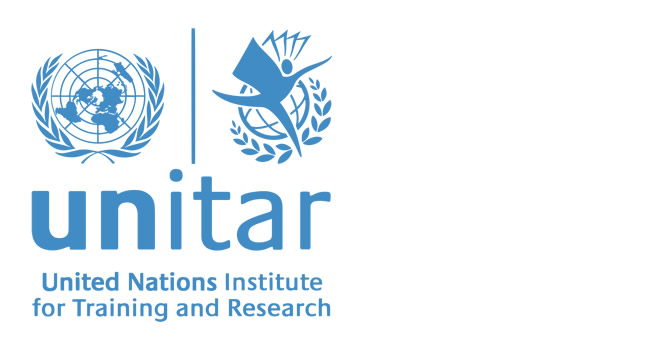
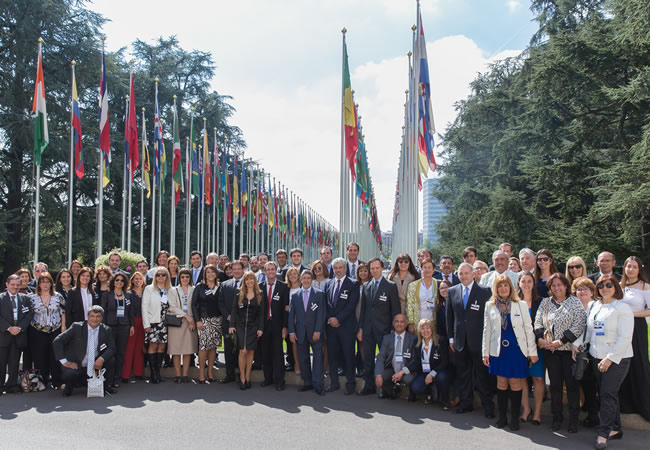
Photo: Participants at a UNITAR International Training Program in Geneva. Image Credit: UNITAR.

Photo: Traffic Lights. Image Credit: VÃÂctor VillamarÃÂn.
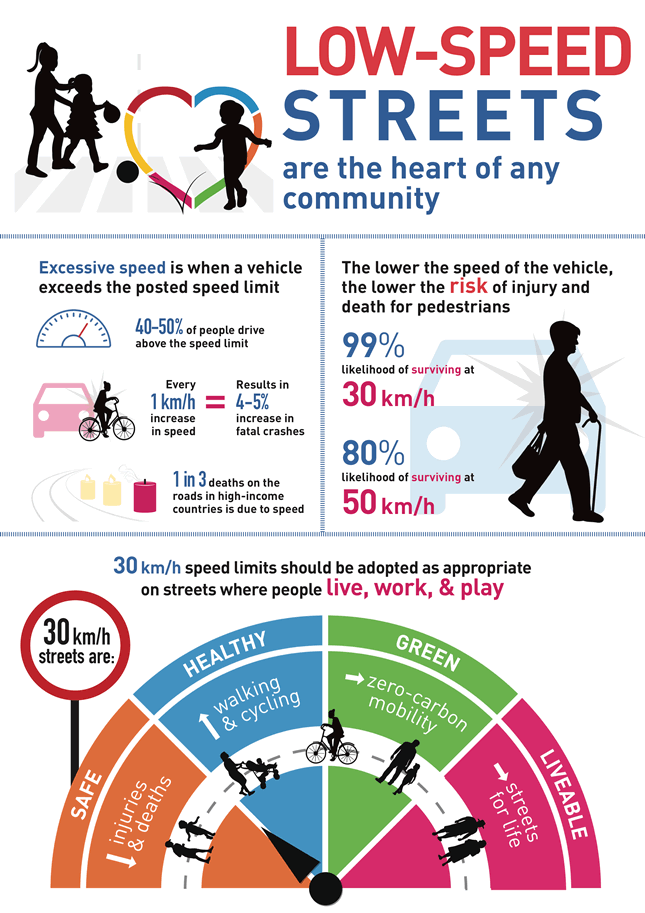
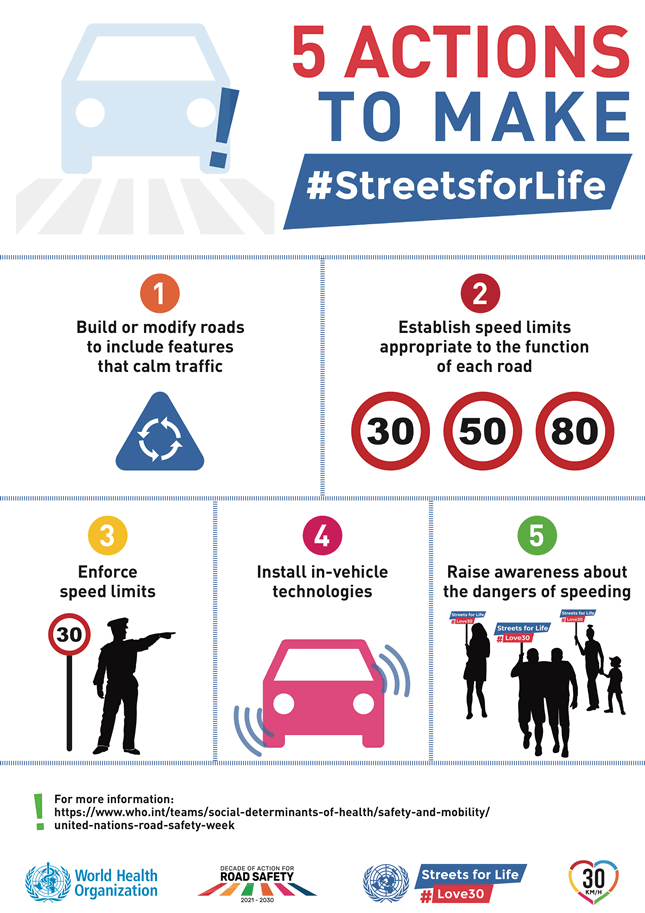
NEW YORK, May 19, 2021 — The United Nations Institute for Training and Research (UNITAR) collaborates with Anheuser-Busch InBev (AB InBev) in a joint effort to curb road traffic fatalities in recognition of the United Nations Road Safety Week (May 17-23, 2021).
UNITAR has asked companies and public entities worldwide to download and implement its “Management Practices for Safer Roads Toolkit.” The Toolkit provides government officials, road engineers, and urban planners with a proven methodology and evidence-based solutions to address road safety issues in their communities.
The Toolkit is accessible via desktop on UNITAR’s website or as a Learning App in the Play Store and App Store for Android and iOS devices. UNITAR is also providing dedicated training workshops to assist governments in utilizing the Toolkit and designing their action plans to support road safety.
The Toolkit and its app provide practical solutions to improve existing road infrastructure to benefit all road users. Among its features, the app provides a checklist to support users in monitoring their Road Safety management progress throughout the different stages of the “Plan-Do-Check-Act” Toolkit’s methodology. This week, the partnership hosted a virtual workshop with public officials in South Africa to exhibit how to best apply the Toolkit to existing faults in the country’s roads.
“We hope that this Toolkit and Learning App serve as a substantive contribution to advance our shared goal of making cities safe, resilient, and sustainable,” said Dr. Deisi Kuztra, member of the Board of Trustees for UNITAR. “The Agenda 2030 reminds us of the urgency to provide access to safe, affordable, accessible and sustainable transport systems for all, thus improving road safety with special attention to the needs of those in vulnerable situations, including women, children, persons with disabilities, and older persons,” she emphasized.
For Road Safety Week 2021, celebrated on May 17-23, the United Nations has called on policymakers globally to take action in favor of low-speed streets worldwide, limiting speeds to 30 km/h (20mph) in residential areas. The knowledge and materials available in the Toolkit provide governments with a clear framework for practical speed limitations and black spot management, among others.
“As part of our tremendous efforts to expand the accessibility of this Toolkit, we have now made it available in 6 languages, including English, Spanish, French, Hindi, Portuguese, and most recently in Italian. We hope it will greatly benefit the organizations and governments working to make a positive impact toward improving road safety,” said Catalina Garcia, Global Director of Corporate Affairs at AB InBev. “The app’s methodology has been continuously tested and improved upon through several local projects in countries like Brazil, China, Dominican Republic, India, Mexico, and South Africa. We are certain that its adoption will continue to lead to positive results and save more lives, and especially now that it’s readily available on any mobile device.”
Road traffic-related deaths and injuries have unparalleled health and socioeconomic implications for society, particularly in areas with high death and injury rates. According to the latest report by the World Health Organization (WHO), about 1.35 million people die on the world’s roads every year, and up to 50 million more are left injured or disabled, a majority of whom are young breadwinners between the ages of 15 and 29. Because of this, the United Nations has set the ambitious goal of reducing road traffic deaths and injuries by 50 percent by the year 2030 as part of its 2030 Agenda for Sustainable Development.
UNITAR and AB InBev’s new app draws from AB InBev’s methodology, collecting data on the number and location of deaths by road user type. It relies on management routines, identifying hazardous and critical road locations where excessive numbers or severity of crashes occur, outlining corrective measures, and implementing and monitoring the appropriate interventions.
The “Management Practices for Safer Roads” mobile app in English is available for free from the App Store for iOS users and the Play Store for all Android devices.
The alliance between UNITAR and AB InBev, through the Partnership for Action on Road Safety, seeks to educate and inform on the importance of road safety. It also facilitates the exchange of experiences and best practices resulting in a long-term collaboration within different factors in society to generate concrete measures that improve mobility and road safety globally and ultimately save lives.
⢠The partnership’s key objectives are:
The alliance also seeks to develop projects on road safety that incentivize taking measures that reduce the various risk factors, such as exceeding the speed limit and irresponsible driving, and the vehicle and road infrastructure design. The initiative intends to socialize this methodology of road safety with governments worldwide and support them in designing and implementing local solutions.
The United Nations Institute for Training and Research (UNITAR) provides innovative learning solutions to individuals, organizations, and institutions to enhance global decision-making and support country-level action for shaping a better future. UNITAR was created in 1963 to train and equip young diplomats from newly independent UN Member States with the knowledge and skills needed to navigate through the diplomatic environment. Over the years, UNITAR has acquired unique expertise and experience in designing and delivering various training activities. It has become a leading institute in providing customized and creative learning solutions to institutions and individuals from both the public and private sectors. With a strategy fully focused on achieving the Sustainable Development Goals (SDGs), UNITAR supports Governments to implement the 2030 Agenda.
Source: United Nations Institute for Training and Research (UNITAR)
|GlobalGiants.Com|
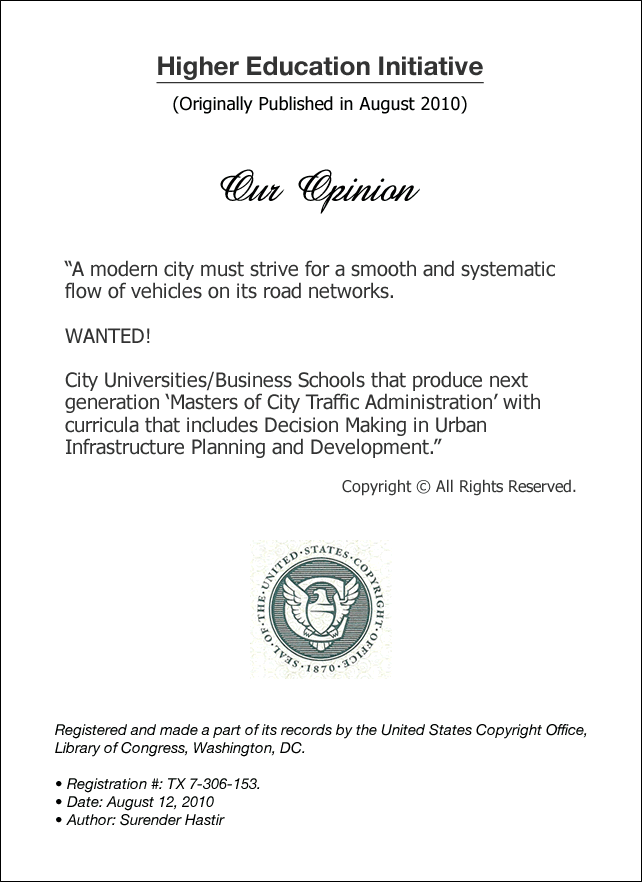
Edited & Posted by the Editor | 4:38 AM | View the original post
⢠Hosted by Michael Douglas at United Nations Headquarters in New York, Concert Caps Extraordinary 10th Anniversary Celebration Spanning More than 190 Countries.

Photo: A Jazz Day Poster.
WASHINGTON, May 3, 2021 — With more than 190 countries participating, the International Jazz Day 10th Anniversary celebration concluded with a thrilling All-Star Global Concert reaching millions worldwide. Hosted by Michael Douglas and led by Herbie Hancock and musical director John Beasley, the concert brought together renowned artists from over 20 countries. It was made possible by Lead Partner Toyota, with United Airlines serving as Airline Partner.
The 2021 Global Concert featured memorable moments illustrating the unifying power of jazz. From New York, Veronica Swift and trumpeter Ingrid Jensen opened the program with “Sing,” an uplifting tribute to the positive change that music can bring to the world. Other standout performances included pianist and composer Jacob Collier in London, Beninese songstress Angélique Kidjo in Paris, Japanese pianist Junko Onishi in Tokyo, Ivan Lins in Rio De Janeiro, and vocalist/trumpeter Mandisi Dyantyis in Cape Town. Capping the remarkable presentation from Los Angeles was a sensational interpretation of “God Bless The Child” by vocalist Andra Day.
Anchored by Academy Award winner Michael Douglas from UN Headquarters in New York, the 2021 concert showcased jazz as a truly global art form. As United Nations Secretary-General Antonio Guterres noted, “Ten years ago, we launched the very first International Jazz Day in the United Nations General Assembly Hall at the initiative of UNESCO and the Herbie Hancock Institute of Jazz. With every passing year, this has been a joyous celebration - not only of music but also of freedom, diversity, and human dignity. These are the values the United Nations works to protect and promote around the world.”
UNESCO and the Herbie Hancock Institute of Jazz presented free educational and outreach programming throughout the day. In one of the most anticipated events, UNESCO Director-General Audrey Azoulay and UNESCO Goodwill Ambassador Herbie Hancock engaged in a moving dialogue on the history and legacy of International Jazz Day.
International Jazz Day brings together countries and communities on all seven continents to honor the international art form of jazz. The event is celebrated with thousands of concerts and jazz-related programming worldwide each year on April 30, highlighting its essential role in encouraging dialogue, combating discrimination, and promoting human dignity.
Source: Herbie Hancock Institute of Jazz
|GlobalGiants.Com|
Edited & Posted by the Editor | 5:17 AM | View the original post
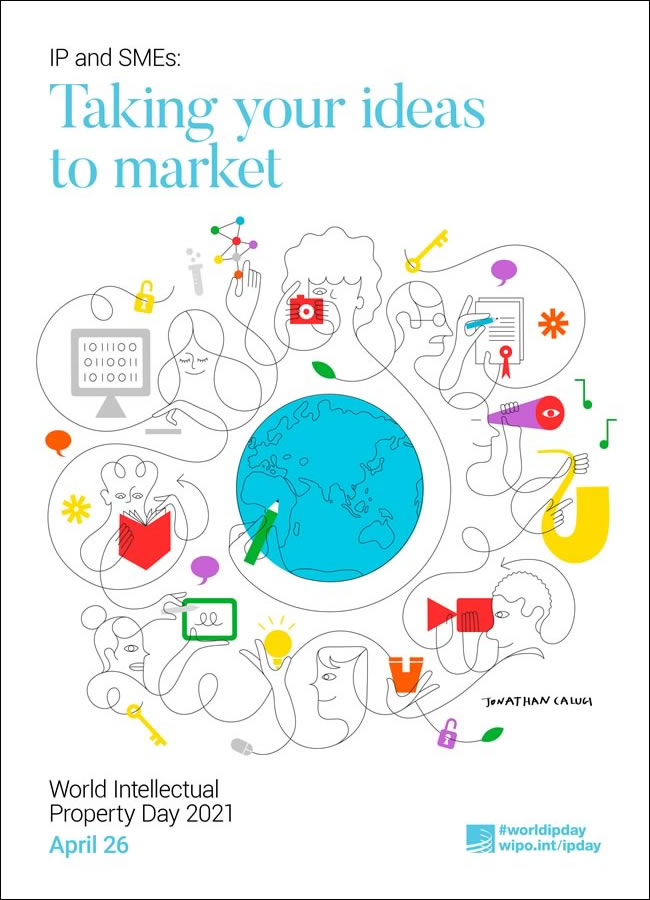
Geneva, April 29, 2021 — Small and medium-sized enterprises take center stage at this year’s celebration of World Intellectual Property Day. WIPO Director General Daren Tang described them as the “unsung heroes” of the global economy and an engine for growth in a post-pandemic world.
In a video message celebrating World IP Day, which occurs each April 26, Mr. Tang said that SMEs account for 90% of all companies worldwide and 70% of global employment. That’s why World IP Day 2021 is carrying the theme “IP and SMEs: Taking your ideas to market.”
“SMEs are the engines, the unsung heroes of our economy. And yet for many of them, there is still a lack of knowledge about how IP can help them translate their ideas into products, and how IP can be a powerful tool for them not just to survive, but also to compete and grow,” he said.
“SMEs face different challenges in different parts of the world, and how we help them will need to be customized to the needs of your part of the world. But it will be a powerful message for us to send the signal that together we will be supporting them,” said Mr. Tang.
Mr. Tang, who took office as WIPO’s Director-General in October 2020, has made supporting smaller enterprises a priority. In one of his first actions as Director-General, he established the “IP and Innovation Ecosystems Sector” as one of the Organization’s eight sectors, with a remit to support SMEs, entrepreneurs, and researchers in commercializing IP and using it for business growth.
“Whatever help we can render to our SMEs will help that we render to the bedrock of your economy and the backbone of the global economy. Ultimately, it will help our world to build back better,” after the COVID-19 pandemic, he said.
WIPO is coordinating a global campaign to highlight the importance of intangible assets to SMEs and the value of IP in supporting SMEs to grow. The Organization has published a series of case studies worldwide telling stories of SMEs that are using IP rights to turn ideas into business opportunities and generate value. WIPO has also provided a wealth of practical information on the best ways for SMEs to protect their intangible assets.
In 2000, WIPO’s member states designated April 26 - the day on which the WIPO Convention came into force in 1970 - as World Intellectual Property Day to increase general understanding of intellectual property (IP). Since then, World IP Day has offered a unique opportunity each year to join with others worldwide to consider how IP contributes to the flourishing of music and the arts and to driving the technological innovation that helps shape our world.
The World Intellectual Property Organization (WIPO) is the global forum for intellectual property policy, services, information, and cooperation. A specialized agency of the United Nations, WIPO assists its 193 member states in developing a balanced international IP legal framework to meet society’s evolving needs. It provides business services for obtaining IP rights in multiple countries and resolving disputes. It delivers capacity-building programs to help developing countries benefit from using IP. And it offers free access to unique knowledge banks of IP information.
Source: WIPO, Geneva
|GlobalGiants.Com|
(The Editor is an Alumnus of the World Intellectual Property Organization Academy (WIPO Academy), Geneva, Switzerland.)
Edited & Posted by the Editor | 2:49 PM | View the original post

Photos: Jazz Day Posters from different countries.
Paris, France, April 22, 2021 — UNESCO Director-General Audrey Azoulay and UNESCO Goodwill Ambassador Herbie Hancock have announced the program for the 10th-anniversary edition of International Jazz Day, with an inspiring series of performances and educational and community outreach initiatives in more than 190 countries.
Hosted by multi-Academy Award-winning actor Michael Douglas, the 2021 All-Star Global Concert will be streamed live from UNESCO in Paris and the United Nations in New York with a lineup of some of the best international artists performing from cities around the world. U.N. Secretary-General António Guterres will speak during the concert. Jazz pianist Herbie Hancock will be the concert’s artistic director, while John Beasley will serve as the concert’s musical director.
“UNESCO created International Jazz Day to share the values of a significant musical genre. Today we need Jazz more than ever. We need its values based on human dignity and the fight against racism and all forms of oppression. It is so much more than music. Jazz is the kind of bridge-builder we need in the world today,” said Audrey Azoulay, UNESCO Director-General, in her message.
“Our International Jazz Day community has displayed incredible resilience, creativity, ingenuity, and compassion throughout the immense challenges of the past year. While the global pandemic continues to make life difficult for so many around the world, the example of organizers from Nepal to Mexico to Cameroon inspires us to greet this historic 10th-anniversary milestone with joy, courage, and hope for the future of Jazz,” Herbie Hancock stated.
The All-Star Global Concert will mark the culmination of International Jazz Day 2021, starting at 9 pm UTC in New York, with performances by:
In Los Angeles, Herbie Hancock will be joined by:
Leading musicians performing from their home countries will be Igor Butman in Moscow (Russia), Ivan Lins in Rio De Janeiro (Brazil), John McLaughlin in Monaco, James Morrison in Mt. Gambier (Australia), Junko Onishi in Tokyo (Japan), and Jacob Collier in London (United Kingdom) and more.
In parallel, an array of virtual and socially distanced activities will occur across the globe on April 30 and in the days leading up to International Jazz Day. Independent artists, UNESCO Creative Cities of Music, and organizers worldwide have curated thousands of concerts, webinars, radio broadcasts, charity fundraisers, marathon jam sessions, educational workshops, art exhibitions, and more adhering to recommended public health guidelines.
YouTube, Facebook, jazzday.com, U.N. Web T.V., UNESCO, and U.S. State Department outlets would webcast the April 30 program live.
UNESCO established international Jazz Day in 2011 at the initiative of UNESCO Goodwill Ambassador Herbie Hancock. The United Nations General Assembly recognizes it. The day brings together countries and communities worldwide every April 30 to celebrate the international art form of Jazz. Jazz Day highlights Jazz’s essential role in encouraging dialogue, combating discrimination, and promoting human dignity. The Herbie Hancock Institute of Jazz is UNESCO’s partner in the organization and promotion of International Jazz Day.
Source: UNESCO
|GlobalGiants.Com|
Edited & Posted by the Editor | 7:50 PM | View the original post
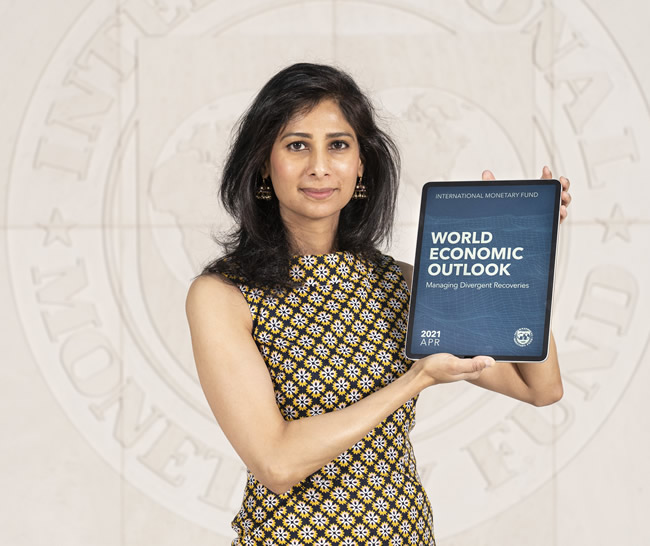
Photo: Chief Economist Gita Gopinath poses before giving the World Economic Outlook during the 2021 Spring Meetings of the International Monetary Fund. April 6, 2021. Washington, DC, United States. IMF Photo/Joshua Roberts.
Washington, DC, April 6, 2021 — The IMF announced an upgrade to global growth in its World Economic Outlook on Tuesday (April 6) in Washington, DC.
IMF has projected that the global economy would grow at 6 percent in 2021, moderating to 4.4 percent in 2022. A significant turnaround from an estimated contraction of -3.3 percent in 2020 when a pandemic hit the world.
“So relative to our January forecast, we are upgrading growth to 6% for 2021 and 4.4% for 2022. It reflects the additional financial support provided in the United States and the vaccination efforts that will strengthen recovery in the second half of this year. It also reflects the continued resilience of economic activity to the pandemic in many parts of the world,” said IMF chief economist Gita Gopinath.
Gopinath stressed that a high degree of uncertainty surrounds the IMF’s projections as the pandemic is yet to be defeated and virus cases are accelerating in many countries.
That’s leading to diverging recoveries both across and within countries, as economies with slower vaccine rollout, more limited policy support, and more reliant on tourism do less well.
“The biggest risk right now is still the pandemic. If there are new virus variants that evade the vaccine, it could lead to a sharp downgrade. But if, on the other hand, there’s the faster rollout of vaccinations, then that could uplift the outlook,” said Gopinath.
She also added that multispeed recoveries could pose financial risks if interest rates in the United States rise further in unexpected ways. It could cause inflated asset valuations to unwind in a disorderly manner, economic conditions to tighten sharply, and recovery prospects to deteriorate, especially for some highly leveraged emerging markets and developing economies.
“The second big risk is to financial conditions. We see multispeed recoveries, and we have seen interest rates go up. If interest rates go up even further in a more disorderly fashion than that could have negative implications for several countries, especially for some highly vulnerable emerging and developing economies,” said Gopinath.
Policymakers will need to continue supporting their economies while dealing with more limited policy space and higher debt levels than before the pandemic, Gopinath added. It requires better-targeted measures to leave room for prolonged support if needed.
“Given that we are not out of the woods, it is crucial for policy support to be continued in this crisis. Of course, countries are dealing with high debt levels, so they’ll have to make sure this support is better targeted and well-tailored to countries’ specific economic conditions, the stage of the recovery they are in, and the structural characteristics of the economy,” she added.
She also urged central banks to keep access to money open in the current environment.
“Monetary policy should also remain accommodative while proactively addressing financial risks of using macroprudential tools,” Gopinath remarked.
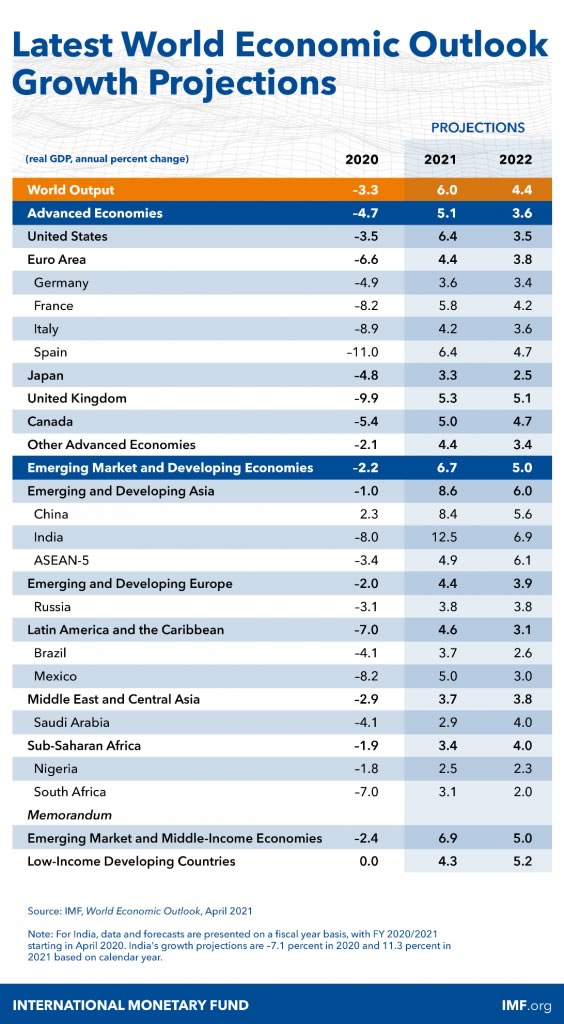
Source: IMF
|GlobalGiants.Com|
Edited & Posted by the Editor | 11:25 AM | View the original post

Photo: Airbus Aircalin A320neo on ferry flight. Image provided by & copyright © AIRBUS.

Photo: Royal Caribbean Adventure of the Seas in Bar Harbor, Maine. Image Credit: Corey Seeman.
⢠Joint Statement from International Civil Aviation Organization (ICAO), International Labour Organization (ILO), International Maritime Organization (IMO), International Organization for Migration (IOM), and World Health Organization (WHO) â¢
Geneva, March 25, 2021.
The coronavirus (COVID-19) pandemic has triggered devastating consequences for human life and the global economy. Maritime and air transport are essential activities that underpin worldwide trade and mobility and are critical to a sustainable socio-economic recovery.
Maritime transport moves More than 80% of global trade by volume. The global economy depends on the world’s 2 million seafarers who operate the global fleet of merchant ships. Travel restrictions imposed during the pandemic have severely impacted the Seafarers. Some 400,000 seafarers are stranded on board commercial vessels, long past their contracts’ expiry. A similar number of seafarers urgently need to join ships to replace them.
Passenger air transport carried about 5.7 billion passengers in 2019, while airfreight represents 35% of the value of goods shipped in all modes combined. According to ICAO personnel statistics, the total number of licensed aviation professionals, including pilots, air traffic controllers, and certified maintenance technicians, was 887,000 in 2019. The application of stringent public health rules to aircrew, including quarantine, has resulted in hindered connectivity, operational complexity, and high cost.
Maritime and air transport rely on seafarers and aircrew. They are vital workers required to travel across borders at all times, resulting in the need for them to present proof of a COVID-19 vaccination as a condition for entry in some countries. It is despite WHO’s recommendation that, at present, governments should not introduce requirements of proof of immunization for international travel as a condition of entry, as there are still critical unknowns regarding the efficacy of vaccination in reducing transmission and limited availability of vaccines. For shipping and air transport to continue to operate safely, governments must facilitate seafarers’ safe cross-border movement. We reiterate our call upon countries that have not done so to designate seafarers and aircrew as crucial workers.
With this statement, our organizations also call on governments to prioritize seafarers and aircrew in their national COVID-19 vaccination programs, together with other essential workers, per the advice from the WHO SAGE Roadmap for prioritizing the use of COVID-19 vaccines in the context of limited supply published in November 2020. Seafarers and aircrew need to be protected through vaccination as soon as possible to facilitate their safe movement across borders. We also call on governments to identify and prepare for the challenges of COVID-19 vaccination of seafarers and aircrew, particularly for seafarers spending long periods away from their home country.
Our organizations fully support the timely development of an internationally harmonized framework for vaccination certificates to facilitate international travel for seafarers and aircrew.
WHO has established a Smart Vaccination Certificate working group. It works to ensure that digitalized versions of vaccine certificates are interoperable. The UN Crisis Management Team for COVID-19, under the leadership of WHO, has recognized that all countries should consider seafarers and aircrew who are required to travel across borders during the pandemic for essential allocation of vaccines.
We invite governments and other stakeholders to bring this joint statement’s contents to the competent authorities’ attention and all parties concerned.
Source: WHO
|GlobalGiants.Com|
Edited & Posted by the Editor | 4:29 AM | View the original post

Photo: Berlin. Watch-traffic lights. Berlin is a UNESCO Creative City of Design. Image credit: Aleksander Markin.
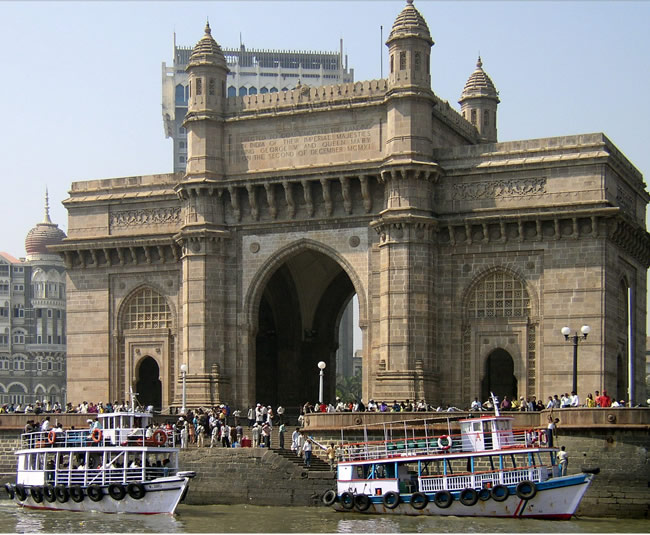
Photo: Gateway of India, Mumbai. Mumbai is a UNESCO Creative City of Film. Image credit: barracuadz.

Photo: Downtown Detroit, Michigan. Detroit is a UNESCO Creative City of Design. Image credit: Corey Seeman.
Created in 2004, the UNESCO Creative Cities Network (UCCN) fosters international cooperation across cities of the world that invest in culture and creativity as accelerators of sustainable development.
Through seven creative fields - Crafts and Folk Art, Design, Film, Gastronomy, Literature, Media Arts, and Music - cities in the Network are innovative with an enormous scope of positive economic, social, cultural, and environmental impacts.
Together with its 246 member cities from over 80 countries, the UCCN aims to fulfill the enabling and transformative power of culture and creativity in building resilient, sustainable, and future-proof cities. It thus supports the implementation of the UN’s 2030 Agenda for Sustainable Development at the local level.
⢠The UCCN Call for Applications is now open to cities from all UNESCO Member States and Associate Members.
UNESCO has invited the interested cities to submit their applications using the official standard Form by 30 June 2021 (midnight CET). Applications received after the deadline, incomplete or transmitted in a different format, will not be considered, UNESCO stated.
Each application should include, among other required documents, an official letter of intent signed by the Mayor of the city and an official letter of support by the National Commission for UNESCO of the country.
For the 2021 Call for Applications, UNESCO would accept a maximum of two applications in two different creative fields from a Member State. Consequently, the National Commission concerned would endorse a maximum of two applications in two separate creative areas from the country.
UNESCO would designate a city as a UNESCO Creative City based on its assets and capacity in culture and creativity and the content, impact, and outreach of its proposed action plan. The city should demonstrate its potential contribution to the Network’s overall vision and objectives. It should confirm its commitment to UNESCO’s mandate and the 2030 Agenda for Sustainable Development.
The member cities represent the following seven creative fields:
UNESCO’s Director-General would designate the new creative cities after an internal technical pre-screening and an external evaluation.
Source: UNESCO
|GlobalGiants.Com|
— The editor contributes towards the enhancement of the UNESCO Creative Cities Network.
Edited & Posted by the Editor | 10:15 AM | View the original post

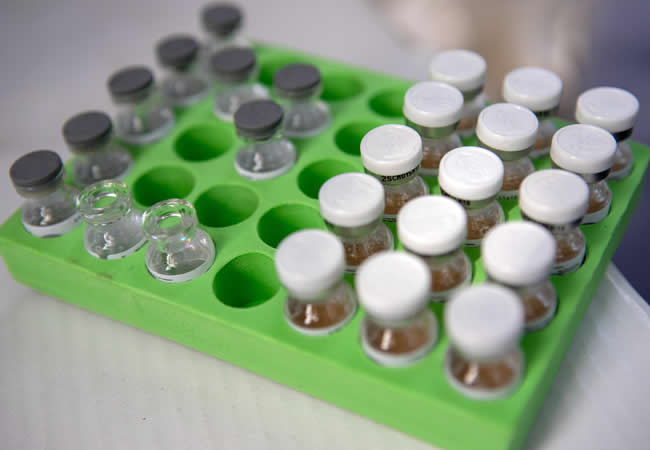
Geneva, March 12, 2021 - The World Health Organization (WHO) today listed the COVID-19 vaccine Ad26.COV2.S, developed by Janssen (Johnson & Johnson), for emergency use in all countries and COVAX roll-out. The decision comes on the back of the European Medicines Agency (EMA) authorization, announced yesterday.
“Every new, safe and effective tool against COVID-19 is another step closer to controlling the pandemic,” said WHO Director-General, Dr. Tedros Adhanom Ghebreyesus. “But the hope offered by these tools will not materialize unless they are made available to all people in all countries. I urge governments and companies to live up to their commitments and to use all solutions at their disposal to ramp up production so that these tools become truly global public goods, available and affordable to all, and a shared solution to the global crisis.”
The vaccine from Janssen is the first to be listed by WHO as a single dose regimen, facilitating vaccination logistics in all countries. The company’s comprehensive data from large clinical trials shows that the vaccine is effective in those 18 years of age and older.
To expedite the vaccine’s listing, WHO and a team of assessors from all regions adopted an ‘abbreviated assessment’ based on outcomes of the EMA review and evaluation of quality, safety, and efficacy data focused on low- and the middle-income country needs. The WHO assessment also considered suitability requirements such as cold chain storage and risk management plans.
While the vaccine needs storage at -20 degrees, which may prove challenging in some environments, we can keep it for three months at 2-8ðC, and it has a long shelf life of two years.
Next week, WHO will convene its Strategic Advisory Group on Immunization Experts to formulate recommendations on using the vaccine. In the meantime, WHO continues to work with countries and COVAX partners to prepare for roll-out and safety monitoring. The COVAX Facility has booked 500 million doses of the vaccine.
⢠WHO emergency use listing
The emergency use listing (EUL) procedure assesses novel health products’ suitability during public health emergencies. The objective is to make medicines, vaccines, and diagnostics available as rapidly as possible to address the crisis while adhering to stringent criteria of safety, efficacy, and quality. The assessment weighs the threat posed by the emergency and the benefit that would accrue from using the product against any potential risks.
The EUL pathway involves a rigorous assessment of late phase-II and phase-III clinical trial data and substantial additional data on safety, efficacy, quality, and a risk management plan. Independent experts and WHO teams review this data, consider the current body of evidence on the vaccine under consideration, monitor its use, and plan further studies.
As part of the EUL process, the company producing the vaccine must generate data to enable full licensure and WHO prequalification. The WHO prequalification process will assess additional clinical data generated from vaccine trials and deployment on a rolling basis to ensure the immunization meets the necessary standards of quality, safety, and efficacy for broader availability.
WHO has also listed the Pfizer/BioNTech, Astrazeneca-SK Bio, and Serum Institute of India vaccines for emergency use.
Source: WHO
|GlobalGiants.Com|
Edited & Posted by the Editor | 6:34 AM | View the original post
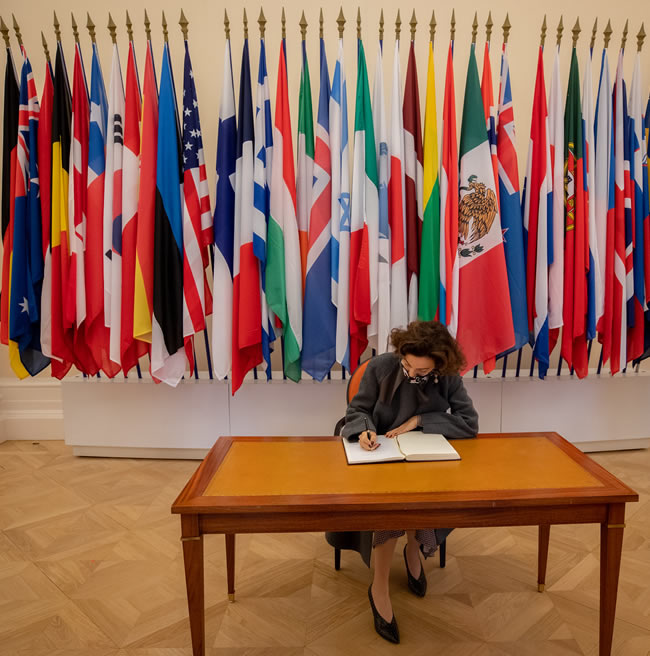
Photo: UNESCO Headquarters, Paris. Commemoration of the 60th anniversary of the signing of the OECD Convention. Image provided by & copyright © UNESCO/Christelle ALIX. [File Photo]
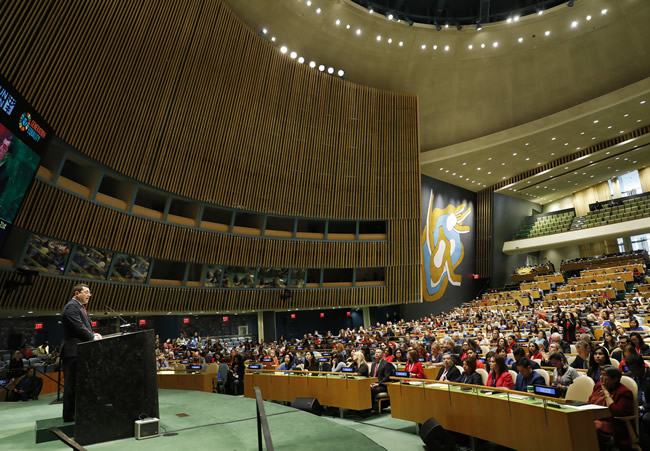
Photo: Scenes from the United Nations Observance of International Women’s Day 2020, held in the UN General Assembly Hall at UN Headquarters in New York on 6 March 2020. Image provided by & copyright © UN Women/Ryan Brown. [File Photo]
Paris, France, March 8, 2021 — On International Women’s Day, UNESCO launched the call for nominations for the 2021 UNESCO Award for Girls’ and Women’s Education. The Prize awards US$ 50,000 annually to two laureates making outstanding efforts in favor of girls’ and women’s education.
Amid the COVID-19 pandemic and in a context where girls and women have been disproportionately impacted by nationwide school closures, ensuring that girls and women continue learning must be a priority. UNESCO estimates that over 11 million girls and young women may not return to school following the pandemic’s impact. About 128 million girls were already out of school before the pandemic, UNESCO said.
The Prize is more significant in these challenging times than ever before. Highlighting innovations that can help us foster an equal future is key to responding to global challenges around girls’ and women’s education, UNESCO added.
OFFICIAL INVITATION
“Governments of the UNESCO Member States and non-governmental organizations (NGOs) in official partnership with UNESCO are now invited to nominate up to three individuals, institutions, or organizations who have made substantial, innovative contributions in favor of girls and women’s education.
“Interested candidates are invited to contact their country’s National Commission for UNESCO/Permanent Delegation to UNESCO or an NGO in official partnership with UNESCO for more information.
“Nominations must meet the eligibility and selection criteria set by the Prize. Nominated projects must be established and running for at least two years, show potential to be replicable and scalable, and contribute to one or more of the priority areas of the Prize.
“An independent International Jury of five experts will assess nominations based on the project’s potential for impact, innovation, and sustainability.
“Deadline for submissions is 26 May 2021 (midnight, Paris time).
“Nominations must be submitted in English or French via an online platform, accessible only to National Commissions for UNESCO/Permanent Delegations to UNESCO and NGOs in official partnership with UNESCO.
“Based on the recommendations of the Jury, the Director-General of UNESCO will announce the 2021 laureates who will receive the award on 11 October 2021 as part of International Day of the Girl Child celebrations.”
Source: UNESCO
|GlobalGiants.Com|
Edited & Posted by the Editor | 8:27 AM | View the original post
⢠Switzerland replaced the Netherlands at the top of UNCTAD’s Business-to-Consumer (B2C) E-commerce Index 2020, which ranks 152 countries on their readiness to engage in online commerce.
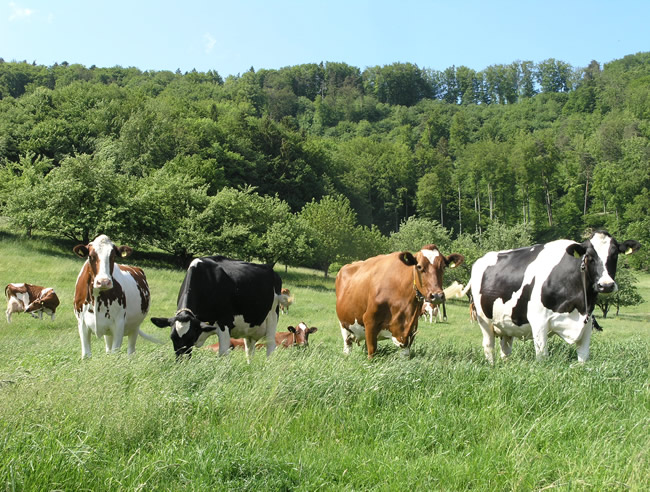
Photo: Switzerland. Swiss cows: Image credit: Nestlé.

Photo: Switzerland. Image credit: Eugene Kaspersky.
Geneva, 17 February 2021 - Europe remains by far the most prepared region for e-commerce, according to UNCTAD’s Business-to-Consumer (B2C) E-commerce Index 2020.
For the first time, Switzerland leads the UNCTAD B2C E-commerce Index, just ahead of the Netherlands. In 2019, 97% of the Swiss population used the internet. The only non-European economies among the top 10 are Singapore, ranked fourth, and Hong Kong (China) in the 10th position.
The index scores 152 nations on their readiness for online shopping, worth an estimated $4.4 trillion globally in 2018, up 7% from the previous year.
Countries are scored on access to secure internet servers, reliability of postal services and infrastructure, and the portion of their population that uses the internet and has an account with a financial institution or mobile money services provider.
⢠Developing countries: Asia leads the pack.
The ten developing countries with the highest scores are all from Asia and classified as high-income or upper-middle-income economies.
At the other end of the spectrum, least developed countries occupy 18 of the bottom 20 positions.
The two largest B2C e-commerce markets globally, China and the United States, rank 55th and 12th respectively in the index. Although both countries lead in several absolute measures, they lag in relative comparisons.
“The e-commerce divide remains huge,” said Shamika N. Sirimanne, director of UNCTAD’s division that prepares the annual index. “Even among G20 countries, the extent to which people shop online ranges from 3% in India to 87% in the United Kingdom.”
Also, in Canada, the United States, and 10 European nations, more than 70% of the adult population makes purchases online. But that proportion is well below 10% in most low- and lower-middle-income countries.
“The COVID-19 pandemic has made it more urgent to ensure the countries trailing behind can catch up and strengthen their e-trade readiness,” Ms. Sirimanne said. The index, she said, underscores governments’ need to ensure more people can avail themselves of e-commerce opportunities.
“Otherwise, their businesses and people will miss out on the opportunities offered by the digital economy, and they will be less prepared to deal with various challenges,” she added.
⢠Changes in the 2020 rankings
The 2020 edition of the index includes a few notable changes from the previous year. In the composition of the top 10 positions, Hong Kong (China) replaced Australia. Among the top 10 developing economies, Oman replaced Turkey.
The four most considerable increases in index scores are in developing countries - Algeria, Brazil, Ghana, and Lao People’s Democratic Republic. Their scores surged by at least five points, primarily due to significant improvements in postal reliability.
Costa Rica became the best performer in the Latin America and the Caribbean (LAC) region, replacing Chile. Mauritius remained the highest scorer in sub-Saharan Africa, while Belarus again got the highest score among transition economies.
⢠Particular focus on Latin America and the Caribbean
The 2020 index takes a closer look at the LAC region, which accounts for 9% of the world’s population aged 15 and older and as much as 11% of the world’s internet users. However, the region’s share of global online shoppers was only 6% of the worldwide total in 2019.
The UNCTAD report notes that five countries account for 92% of online shoppers in LAC, much higher than their share (72%) of the region’s population. Postal unreliability is the region’s most prominent e-commerce infrastructural weakness, particularly in the Caribbean.
As seen globally, COVID-19 has boosted online shopping in the region. For example, 7.3 million Brazilians shopped online for the first time during the pandemic. And in Argentina, the number of first-time online buyers during the pandemic was equivalent to 30% of the 2019 online shopping base.
⢠Top 10 economies in the UNCTAD B2C E-commerce Index 2020
Source: UNCTAD
|GlobalGiants.Com|
Edited & Posted by the Editor | 3:14 PM | View the original post
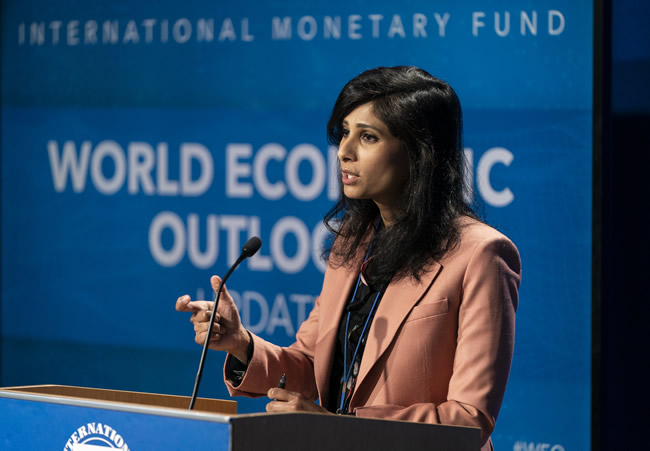
Photo: International Monetary Fund. World Economic Outlook Update. Economic Counselor and Director of the Research Department, Gita Gopinath, delivers the World Economic Outlook at the IMF headquarters. IMF Photo/Joshua Roberts. January 26, 2021. Washington, DC, United States of America.

Photo: International Monetary Fund. Snow in Washington, DC. Pedestrians walk past the International Monetary Fund’s HQ1 and HQ2 buildings during the season’s first snow in Washington, DC. IMF Photo/Cory Hancock. December 16, 2020. Washington, DC, United States of America.
Washington, DC, January 31, 2021 / — Global growth is getting an upgrade. However, prospects for recovery are still highly uncertain due to the race between rolling out vaccines and mutations to COVID-19, the IMF says in its latest quarterly update to the World Economic Outlook report (January 20).
“We are living in highly uncertain times. We are projecting the world would grow this year instead of a severe collapse last year, but there is uncertainty. A lot depends upon the outcome of this race between a mutating virus and vaccines and how much policy support can hold up,” IMF Head of Research Gita Gopinath told reporters in a virtual briefing.
The IMF forecasts a 5.5% boost in growth in 2021, after a 3.3% drop in 2020 - the most severe hit to the global economy since the Great Depression.
But not all countries and regions are growing at the same pace, the IMF says.
The global recovery looks uneven, and the Covid-19 crisis won’t be over for anyone until it gets solved for everyone, Gopinath said. Countries need to cooperate and share resources to ensure an equitable and rapid distribution of the vaccine.
“The international community must act quickly to make sure that vaccinations and the logistics of delivery of the vaccine vaccinations are available globally to address what is currently a deeply inequitable distribution of access to vaccines across the world,” the IMF’s chief economist added.
“The health and economic arguments for this are just simply overwhelming. The new virus strain says, as we have made abundantly clear, that the pandemic is not over until it’s over everywhere. And we estimate there the benefit of more rapid progress towards ending the health crisis. It will add nine trillion dollars cumulatively to the global economy between 2020 and 2025, with benefits for all countries, including advanced economies of around four trillion dollars,” said Gopinath.
The IMF recommends that countries with fiscal space continue to use those resources to support those people and companies in need of help in the crisis.
One example many are watching: the Biden Administration and Democrat’s proposed $1.9 trillion support package could significantly boost growth. However, Gopinath said it was early days to assess its impact.
“For the U.S. economy, we have this can raise output, incomes or output in the U.S. by five percent over three years. That’s what we have estimated, including increasing growth this year by one and a quarter percent. But again, to be very clear, this is all still preliminary,” added Gopinath.
Source: IMF
|GlobalGiants.Com|
Edited & Posted by the Editor | 3:29 AM | View the original post
 |
 |
